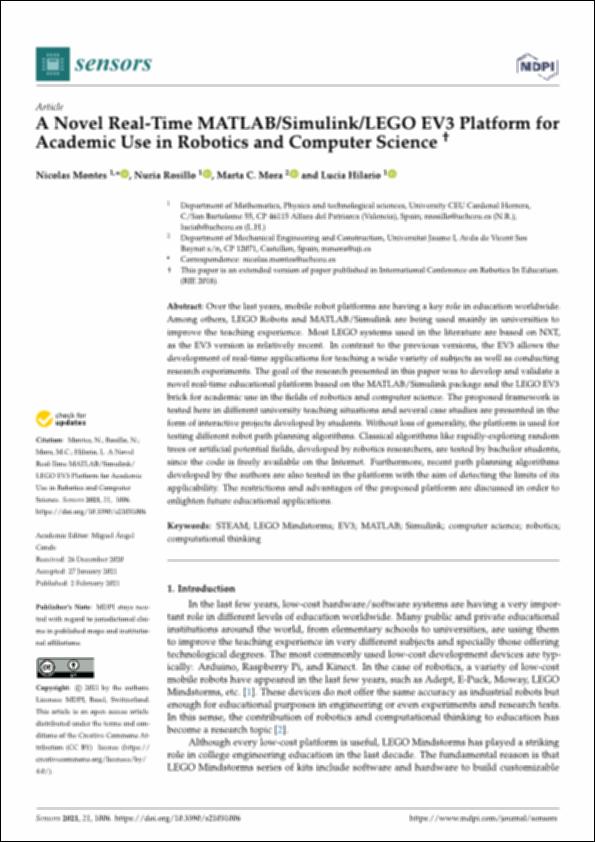Please use this identifier to cite or link to this item:
http://hdl.handle.net/10637/13590A novel real-time MATLAB-Simulink-LEGO EV3 platform for academic use in Robotics and Computer Science
| Title: | A novel real-time MATLAB-Simulink-LEGO EV3 platform for academic use in Robotics and Computer Science |
| Authors : | Montés Sánchez, Nicolás Rosillo Guerrero, Nuria Mora Aguilar, Marta Covadonga Hilario Pérez, Lucía |
| Keywords: | Métodos de simulación.; Simulation methods.; Informática - Aplicaciones en educación - Enseñanza universitaria.; Robotics in education - Education (Higher); Educational technology - Education (Higher); Robótica - Aplicaciones en educación - Enseñanza universitaria.; Computer science in education - Education (Higher); Educación - Innovaciones tecnológicas - Enseñanza universitaria.; Education - Technological innovations - Education (Higher); Tecnología educativa - Enseñanza universitaria. |
| Publisher: | MDPI |
| Citation: | Montes, N., Rosillo, N., Mora, M. C. & Hilario, L. (2021). A novel real-time MATLAB/Simulink/LEGO EV3 platform for academic use in Robotics and Computer Science. Sensors, vol. 21, i. 3 (02 feb.), art. 1006. DOI: http://dx.doi.org/10.3390/s21031006 |
| Abstract: | Over the last years, mobile robot platforms are having a key role in education worldwide. Among others, LEGO Robots and MATLAB/Simulink are being used mainly in universities to improve the teaching experience. Most LEGO systems used in the literature are based on NXT, as the EV3 version is relatively recent. In contrast to the previous versions, the EV3 allows the development of real-time applications for teaching a wide variety of subjects as well as conducting research experiments. The goal of the research presented in this paper was to develop and validate a novel real-time educational platform based on the MATLAB/Simulink package and the LEGO EV3 brick for academic use in the fields of robotics and computer science. The proposed framework is tested here in different university teaching situations and several case studies are presented in the form of interactive projects developed by students. Without loss of generality, the platform is used for testing different robot path planning algorithms. Classical algorithms like rapidly-exploring random trees or artificial potential fields, developed by robotics researchers, are tested by bachelor students, since the code is freely available on the Internet. Furthermore, recent path planning algorithms developed by the authors are also tested in the platform with the aim of detecting the limits of its applicability. The restrictions and advantages of the proposed platform are discussed in order to enlighten future educational applications. |
| Description: | Este artículo se encuentra disponible en la siguiente URL: https://www.mdpi.com/1424-8220/21/3/1006 Este artículo de investigación pertenece al número especial "Mechatronics and Robotics in Future Engineering Education". |
| URI: | http://hdl.handle.net/10637/13590 |
| Rights : | http://creativecommons.org/licenses/by/4.0/deed.es |
| ISSN: | 1424-8220 (Electrónico) |
| Issue Date: | 2-Feb-2021 |
| Center : | Universidad Cardenal Herrera-CEU |
| Appears in Collections: | Dpto. Matemáticas, Física y Ciencias Tecnológicas |
Items in DSpace are protected by copyright, with all rights reserved, unless otherwise indicated.


